|
|
|
Sort Order |
|
|
|
Items / Page
|
|
|
|
|
|
|
| Srl | Item |
| 1 |
ID:
183507


|
|
|
|
|
| Summary/Abstract |
Australian IR scholars and scholarship have been prominent in framing, informing and contributing to global debates in the field of global environmental politics. This article reviews and analyses those contributions with a focus on the period since 2009. It takes as a starting point research that addresses international or global environmental issues, including those that demand a scalar approach to how the global is voiced and experienced at local and regional sites, and that, in doing so, illuminates key disciplinary concerns and contributes to disciplinary debates. The core of the article is woven around three overlapping sub-fields: global environmental governance, international political economy, and normative IR. It reveals how Australian-based IR scholars working on the environment have engaged with critiques of neo-liberalism, pursued more critical approaches to securitization, expanded the empirical and conceptual basis of how we understand institutional ecosystems, contributed to bringing social justice concerns to the forefront of global environmental politics and theory, and been part of a conversation about environmental challenges in the Asia Pacific region. The article concludes with some thoughts about the future direction of this research and scholarship.
|
|
|
|
|
|
|
|
|
|
|
|
|
|
|
|
| 2 |
ID:
183513


|
|
|
|
|
| Summary/Abstract |
Australian strategic studies scholars have traditionally made an outsized impact on the world stage. This reflection upon the past, present and future of their field begins by seeking to explain why. It then takes stock of Australian strategic studies today, finding a flourishing field that stacks up remarkably well, even when measured against the exploits of its illustrious past. The essay concludes by identifying the main challenges and opportunities facing Australian strategic studies going forward, suggesting possible approaches for addressing these.
|
|
|
|
|
|
|
|
|
|
|
|
|
|
|
|
| 3 |
ID:
183511
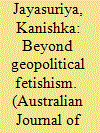

|
|
|
|
|
| Summary/Abstract |
The study and practice of Australian International Relations requires a geopolitical economy agenda so that some of the key political and strategic challenges we face can be adequately understood and theorised. This includes an understanding of new forms of geopolitical contests that are reconstituting the boundaries between economic and security domains. The understanding of these security and political challenges in Australian International Relations is tethered to a terminology such as containment borrowed from the cold war conceptual arsenal. It has driven the government research agenda to security and strategic issues. Such government agendas have a deeply problematic influence—not the least of which are through research funding policies on academic research in International Relations. A comprehensive understanding of these new modes of geopolitical contestation requires an examination of the interactive relationship between geopolitical and capitalist transformations. In order to understand transformations in the global capitalist economy and the emergence of new modes of geopolitics, we require a geopolitical economy research agenda. This paper proposes a framework of uneven and combined development (UCD) as one useful framework to understand the nature of geopolitical contests in the early twentyfirst century.
|
|
|
|
|
|
|
|
|
|
|
|
|
|
|
|
| 4 |
ID:
183512
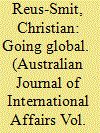

|
|
|
|
|
| Summary/Abstract |
Australian International Relations (IR) has grown dramatically in recent years, but more importantly, it has internationalised and diversified. Australian scholars areleading voices in many of the field’s central debates, addressing a multiplicity of questions, empirical and theoretical. Globally, however, the field of IR is at a crossroad. It is challenged to acknowledge its Eurocentric origins and biases, grasp the long shadow that empire casts over the international system, and shed its intellectual blinkers by drawing on non-Western ideas, practices, and historical experiences. This demands more of Australian scholars than continued international engagement: it poses far reaching questions about the field we are engaging, who we will be in this field, and the direction our contributions will nudge IR. This article explores the challenges and opportunities that ‘going global’ present. Crucially, it requires an ontological reorientation in how we conceive international relations as a domain of politics and demands a shift in normative reasoning, emphasising the ethics of recognition and hierarchy. Making these moves offers exciting opportunities for the revitalisation of the study of Australian foreign policy, enabling us to rethink the ‘foreign’ in such policy, the evolution of the ‘rules-based international order’, and the nature of ‘region’.
|
|
|
|
|
|
|
|
|
|
|
|
|
|
|
|
| 5 |
ID:
183509


|
|
|
|
|
| Summary/Abstract |
Initially Western scholars generally assumed that Russia would become a ‘normal’ democratic state, taking its place in the existing world order. They attributed this to Yeltsin's democratic credentials, but they could do so only by ignoring the clear flaws in Russian democracy as it developed under his presidency. This means that when Russia moved in a more authoritarian direction under Yeltsin’s successor Vladimir Putin, the explanation that most gave for this was the agency of Putin. He was seen as reinstating many of the elements of the Soviet legacy, including the role of the security apparatus. Putin’s rise was also seen as decisive in the shift of Russia’s international position from one seeking accommodation within the existing international architecture to one seeking to revise that architecture in ways objectionable to the West. The result is said to be a new cold war. But there is disagreement about how this should be understood: is Russia acting as a traditional great power, and therefore understandable through the established principles of international relations, or is she still claiming Soviet-style exceptionalism? What is clear, and many do not appreciate, is that even when Putin has gone, Russia’s core interests will likely not change.
|
|
|
|
|
|
|
|
|
|
|
|
|
|
|
|
| 6 |
ID:
183504


|
|
|
|
|
| Summary/Abstract |
The temptation to … regard international affairs as capable of slick and snap judgements is very strong. If we are to make the leadership of the democracies effective and to arm our governments with adequate support for wise and noble policies, it is important that we recognise that international affairs are enormously involved and require more than passing thought for adequate judgement … The well-being or destruction of civilisation rests precariously upon the ebb and flow of opinion and attitude among peoples torn with passion and prejudice, and with very ill-equipped knowledge.
|
|
|
|
|
|
|
|
|
|
|
|
|
|
|
|
| 7 |
ID:
183506
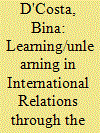

|
|
|
|
|
| Summary/Abstract |
As an auto-ethnography, this essay offers my learning and teaching in International Relations through the politics of margins and silences. I note that recentering margins and unpacking multiple silences are not so simple. They generate their own discomforts and unlearning. Through my academic encounters of forging feminist relationships, debating race and racism, and efforts to decolonise knowledge in academia, I observe that these are compounded (and complicated) by everyday life and personal struggles. I maintain that despite crucial progress in the discipline, knowledge is being produced about people, who are actual repositories of knowledge and we have learnt little from them. While margins of the discipline is now a thriving and powerful space, it is appropriated by privileged voices, including those of feminists of global south and north, who are embedded in institutional and structural hierarchies. We need radical, multi-disciplinary methodological tools to decentre state and regional interests and unlearn some of the traditional ways we have been taught to think about what is IR and what is not.
|
|
|
|
|
|
|
|
|
|
|
|
|
|
|
|
| 8 |
ID:
183514


|
|
|
|
|
| Summary/Abstract |
Living through global transformations – including our current pandemic – requires imagination to see through to the other side. How can Australian IR scholars contribute new understandings of the prospects for global change and security when they are so sorely needed? This essay reflects on two themes: First, the important role of Australian IR scholars and students in theorising change and envisioning alternative futures in a national context less constrained by the trappings of power and enduring forced isolation during the COVID-19 pandemic; and second, the significance of increasing gender diversity in political leadership for future transformations in international relations. A productive feminist subfield of IR scholarship has flourished in Australian universities, however, navigation of post-COVID global politics requires all IR scholars to critically examine the gendered games that political leaders, institutions, inter-state and global civil society actors play. Such gendered games both fuel and mitigate the dynamics of conflict and insecurity.
|
|
|
|
|
|
|
|
|
|
|
|
|
|
|
|
| 9 |
ID:
183505
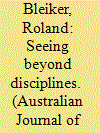

|
|
|
|
|
| Summary/Abstract |
This essay outlines the contribution that Australia-based scholars have made to aesthetic politics: the exploration of creative and interdisciplinary approaches to International Relations. The struggle to legitimise aesthetic insights is indicative of a larger challenge: how academic disciplines discipline thought in ways that constrains innovative scholarly contributions and their potential to address concrete political problems. The essay advances an argument in favour of seeing beyond the discipline of International Relations. The international is not some higher-order realm that is separate from the rest of the social and political world. The most pressing challenges, from terrorism to climate change, are too complex to be understood as uniquely international phenomena. They implicate the local as much as the global, the psychological as much as the institutional and the relational as much as the structural. Finding practical and policy-relevant solutions to complex transnational problems requires insights from fields as diverse as psychology, neuroscience, literature, demography art and economics, to name just a few. Needed, then, is greater acceptance and support for creative approaches that can understand and address political challenges from multiple parallel perspectives and without having to adhere to preconceived disciplinary conventions.
|
|
|
|
|
|
|
|
|
|
|
|
|
|
|
|
| 10 |
ID:
183508
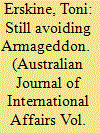

|
|
|
|
|
| Summary/Abstract |
Frequently inspired by the spectre of existential risk, Australian IR scholars have made – and continue to make – a crucial contribution to the evolution of normative IR theory. In defending this position, this article takes three steps. First, it outlines key catalysts that prompted the emergence of this sub-field as a distinct and self-aware area of study approximately forty years ago and refines the story of its genesis by recognising pioneering Australian contributions. Second, it turns to the previous generation of Australian IR to explore the work of two prominent scholars – and ‘neglected antecedents’ – who both prefigured and helped to establish the intellectual context for normative IR theory. Specifically, it focuses on the scholarship of Coral Bell and Hedley Bull and maintains that the classical approach and interpretive methodology that their work exemplified and fostered was particularly conducive to the subsequent development of a sub-field focused on questions of international ethics. Finally, this article contemplates the future of normative IR theory in Australia by highlighting its current flourishing, acknowledging the seemingly intractable practical challenges that it must address, and proposing that it might better confront them by turning to a hitherto overlooked Australian ethical perspective.
|
|
|
|
|
|
|
|
|
|
|
|
|
|
|
|
| 11 |
ID:
183510
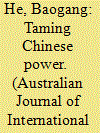

|
|
|
|
|
| Summary/Abstract |
As China grows in international importance and influence, more and more countries worry about how it will behave, and are preoccupied with the hard question of how to tame it. As a middle power Australia has sought ways to influence the thinking and behaviour of Chinese policymakers. The Australian approach to taming China represents an academically puzzling and politically intriguing case, which, unfortunately, has not been studied in detail. The paper has argued that the concept of taming offers significant intellectual advantages in its reconsideration of Australia’s China policy and has called for Australian scholars and policymakers, to critically rethink unspoken and understudied Australia’s taming practices and policies. To this end, this paper has proposed an experience-based theory of taming as a key research agenda.
|
|
|
|
|
|
|
|
|
|
|
|
|
|
|
|
|
|
|
|
|